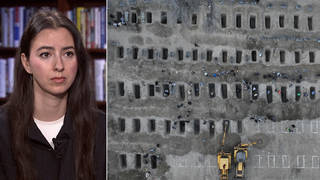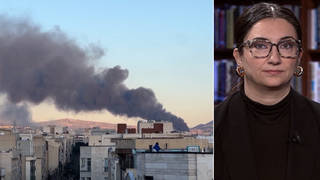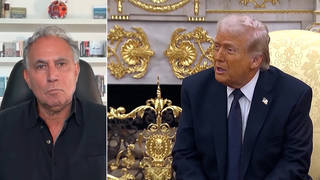
President Trump secretly signed a directive approving the Pentagon’s use of military force on foreign soil to target Latin American drug cartels, according to a New York Times report. The order gives the Pentagon authority to direct military operations at sea and on foreign soil against cartels designated by the Trump administration to be terrorist organizations. “I think it’s directed mostly in Venezuela,” says Alexander Aviña, associate professor of Latin American history at Arizona State University. The U.S. “has used the war on drugs as another way to advance the U.S. imperial geopolitical designs in the Western Hemisphere.”
Transcript
AMY GOODMAN: This is Democracy Now!, democracynow.org, The War and Peace Report. I’m Amy Goodman, with Juan González.
We turn from deploying troops at home to deploying them abroad. The New York Times revealed President Trump secretly signed a directive approving the Pentagon’s use of military force on foreign soil, he says, to target Latin American drug cartels. According to the Times, the order provides the Pentagon authority to direct military operations at sea and on foreign soil against cartels designated by the Trump administration to be terrorist organizations.
Last week, Secretary of State Marco Rubio spoke about targeting drug cartels during an interview with the Catholic news outlet EWTN.
SECRETARY OF STATE MARCO RUBIO: It allows us to now target what they’re operating and to use other elements of American power, intelligence agencies, the Department of Defense, whatever, to target these groups, if we have an opportunity to do it. We have to start treating them as armed terrorist organizations, not simply drug-dealing organizations. Drug dealing is the kind of terrorism they’re doing, and it’s not the only.
AMY GOODMAN: Mexican President Claudia Sheinbaum lashed out at Trump’s move, saying, “The United States is not going to come to Mexico with the military. We cooperate, we collaborate, but there is not going to be an invasion. That is ruled out, absolutely ruled out.” President Sheinbaum spoke at a news conference Monday.
PRESIDENT CLAUDIA SHEINBAUM: [translated] I was informed there would be an order, but it has nothing to do with the country of Mexico. It has to do with their country, not our country.
AMY GOODMAN: For more, we’re joined by Alexander Aviña. He has extensively researched and written about capitalism, the U.S.-backed “war on drugs” and state violence, associate professor of Latin American history at Arizona State University, author of the award-winning book, Specters of Revolution: Peasant Guerrillas in the Cold War Mexican Countryside.
Welcome to Democracy Now!, Professor. If you can start off by talking about the significance of this secret directive that Trump has signed, for Mexico and beyond?
ALEXANDER AVIÑA: Good morning. Thank you for having me.
This is, I think, a really dangerous directive that threatens to generate and unleash violence throughout any of the Latin American countries that the Trump administration may target under this broadly defined struggle against terrorism that they are now using to describe their fight against Latin American drug cartels.
You know, part of — one of the things that we should start with is to think about how the war on drugs is never really about drugs. It’s a war against — the way it’s unfolded in Latin America in the last five, six decades, it’s actually a war against poor people. So, they may — the Trump administration may say that the targets are, you know, six different transnational drug trafficking organizations from Mexico, two from Central America and one shadowy one from Venezuela. but what’s going to — the people who are going to suffer from any sort of unilateral U.S. military action in Latin America are everyday civilians and communities, because it’s really difficult to discern, in many instances, who is a narco and who is not a narco, for a variety of different reasons.
And also, we need to think about how the U.S. historically has used the war on drugs as another way to advance U.S. imperial geopolitical designs in the Western Hemisphere, using it to attack governments that they deem to be a threat to U.S. national security, while at the same time working with unsavory governments who are actually involved in drug trafficking, but because they’re anti-communism and authoritarian, the U.S. is willing to work with them. And we have ample examples from history that play this out.
JUAN GONZÁLEZ: And, yes, Professor, I wanted to follow up with that in terms of this whole idea of this being new for the U.S. military being involved in Latin America. Of course, there were reports that the Delta Force commandos were involved with the Colombian military in the killing of Pablo Escobar in 1993; of course, the CIA’s direct involvement in the killing of Che Guevara; the U.S. military providing air support for the Bay of Pigs invasion. There are so many of these examples already of the U.S. military directly intervening in Latin American countries. So this isn’t really anything new, is it? What I found most interesting was this doubling of the reward for the capture of Nicolás Maduro, who’s already been indicted for drug trafficking here in the United States, even though there’s very scant evidence of that in his own home country.
ALEXANDER AVIÑA: No, you’re entirely correct, Juan. I think this is the — the immediate context of this directive, the way I see it, is the recent announcement that the bounty on Nicolás Maduro had been raised to $50 million because he’s alleged by the U.S. government to be the head of this shadowy drug cartel organization called El Cártel de los Soles, or the Cartel of the Suns. And let’s recall that there’s been regime change efforts and operations against Venezuela going back to the Obama administration, when he designated Venezuela to be a national security threat. During the first Trump administration, they ratcheted up economic sanctions and waged a level of economic warfare that has produced a Great Depression, a U.S.-style Great Depression on different orders of magnitude, according to reporting of Jeff Stein from The Washington Post. In 2020, we had — I think that was the first time that Nicolás Maduro was charged to be involved in drug trafficking efforts into the United States. So, this is — I mean, even we don’t have — we can go — we don’t have time to go back all the way to post-World War II and all the different times during the Cold War that the U.S. used, again, the war on drugs to support pliant, authoritarian, right-wing allies while going after revolutionary governments. There’s numerous instances.
But I think in this — the immediate context in this situation is that this is part — I think it’s directed mostly at Venezuela. I think it’s part of an attempt to continue regime change operations. And this is — again, Venezuela offers a really interesting case study, because the very anti — the very counternarcotic efforts that the U.S. is waging against Venezuela attacks and affects everyday people in Venezuela, and then generates the very processes that the Trump administration tries to fight at the U.S.-Mexico border, namely, mass displacement and people robbed of the right to stay home, who then flee their country because of this economic warfare and then try to make it into the United States. So, that’s one of the insidious things about the war on drugs, is, one, it’s never going to end, because it’s not about drugs, and, two, it generates the very processes that it says it’s fighting against. And in this situation, we have a combination of the war on drugs, the global war on terror and the war on migrants.
JUAN GONZÁLEZ: Yeah, I wanted to ask you briefly also about how Mexico’s President Claudia Sheinbaum has been dealing with not only the militarization of the border, but now these threats of possible U.S. intervention against the cartels within her own country.
ALEXANDER AVIÑA: It’s really difficult to be a neighbor of the United States, because also what this issue brings up is the U.S.'s historical and current claim that it can violate the national sovereignty of any Latin American, Caribbean nation when it sees fit, on whatever premise or justification that it wants to use. The president for — historically, Mexico has had a tense, fraught relationship with the United States, because the United States' unwillingness to recognize the national sovereignty and the self-determination of its southern border. That’s why the U.S. has invaded Mexico on several times and taken half of its national territory in the 19th century.
So, President Claudia Sheinbaum has to walk a tightrope — on the one hand, has to constantly and consistently defend the national sovereignty of her country, but drug trafficking and drug production is a real issue. So, how do you — she’s — how do you collaborate in a cooperative, productive way with a neighbor who for the last three, four years has been saying, you know, “We want to invade Mexico or engage in different types of military activities against drug trafficking organizations based in Mexico”? So, she’s in a really difficult situation. You know, her predecessor, Andrés Manuel López Obrador, famously expelled the DEA from Mexico. But military-to-military relationships and contacts never ended. We have special forces units within the U.S. military who continue to train their counterparts in the Mexican military, you know, plans and programs that have continued under President Sheinbaum. So, she’s walking a tightrope, and it’s really — she also has to deal with the tariff issues. So, I would not want to be in her position. But I think what she comes back to is consistently defending the national sovereignty of Mexico, as she should, as I think is the appropriate way forward.
AMY GOODMAN: Alexander Aviña, we want to thank you for being with us, associate professor of Latin American history at Arizona State University, extensively researched the U.S.-backed so-called war on drugs and state violence, speaking to us from Phoenix, Arizona. Please stay after the show. We’d like to do a post-show in Spanish, and we will post it online at democracynow.org.
Next up, the U.N. special rapporteur on freedom of expression, Irene Khan, on Israel’s assassination of six Palestinian journalists in Gaza, five from Al Jazeera. Stay with us.
[break]
AMY GOODMAN: “The Healers” by the late, great Randy Weston. To see our interview with him and his performance, you can go to democracynow.org.











Media Options